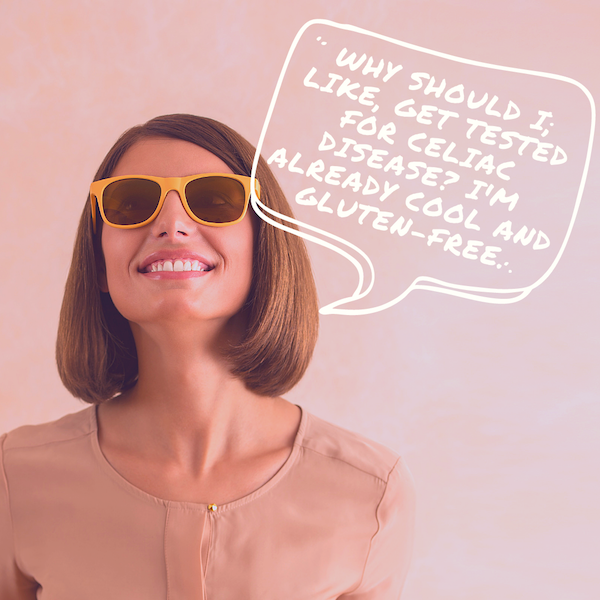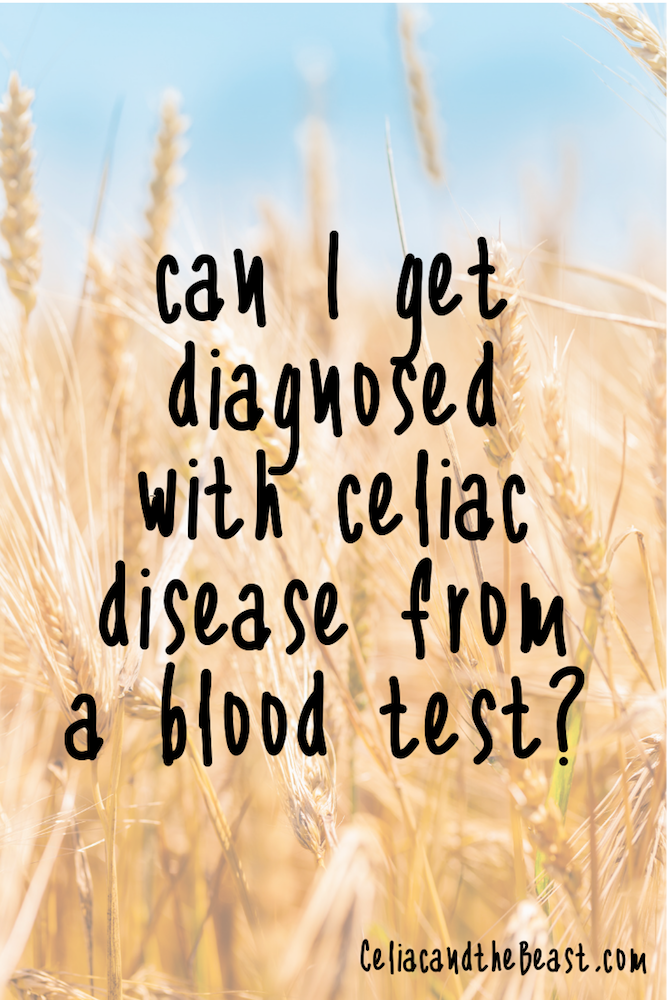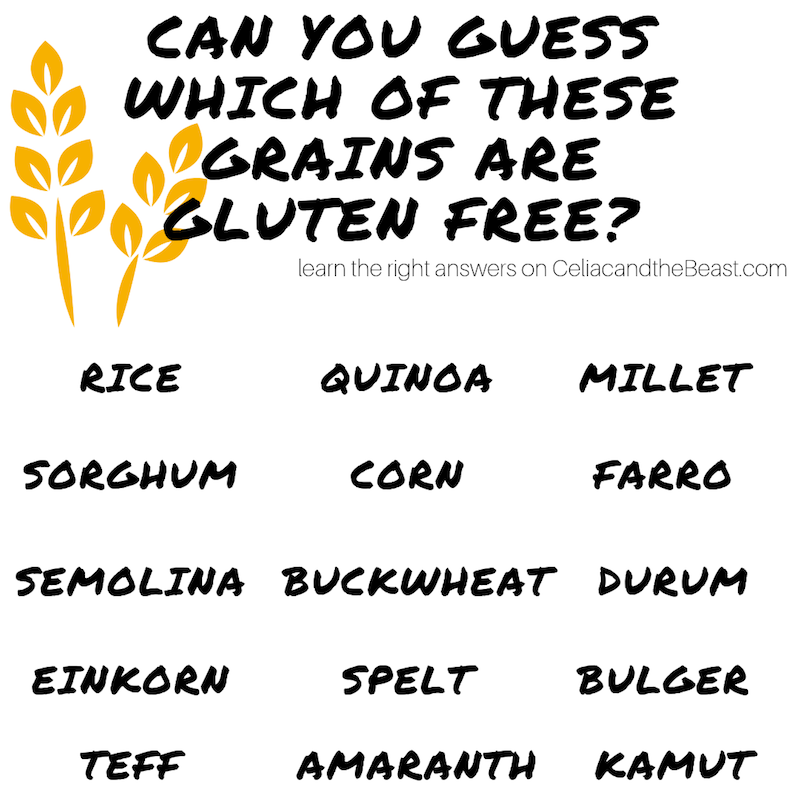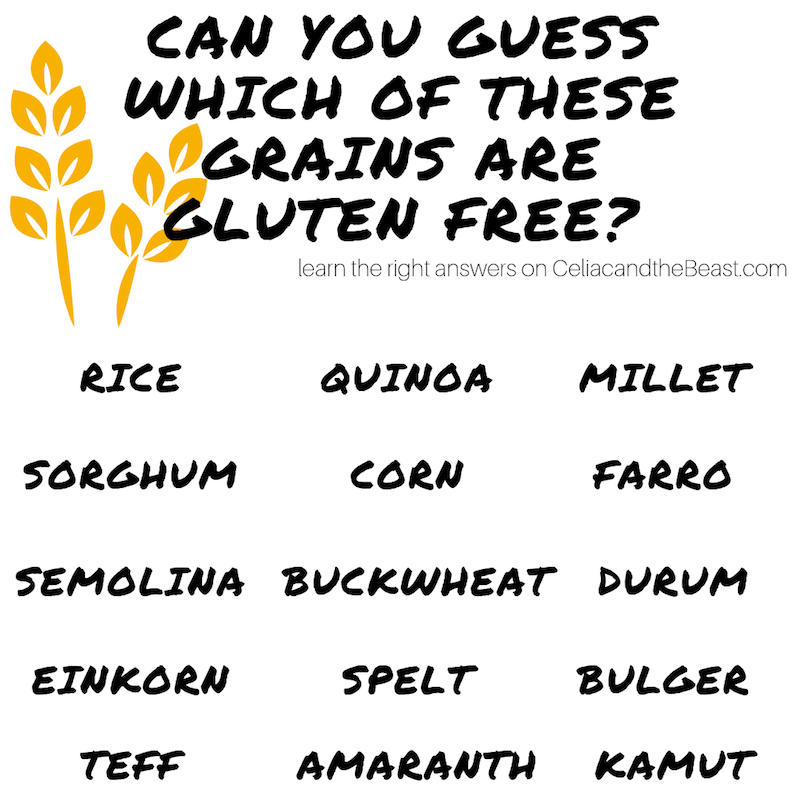What’s in the gluten-free diet? What is celiac disease? How do I know if I have celiac disease? What do I eat with celiac disease? There are a lot of questions with the gluten-free diet and celiac disease. Can you pass the test? Take the celiac disease quiz!
Scroll carefully! The answers are after the graphic for each question!
Why should you get tested for celiac disease?
A. You could have something else that mimics celiac disease
B. You need follow up biopsies and blood work if diagnosed
C. You can get a tax break on gluten-free food if diagnosed

Answer: All of the above! You should get tested for celiac disease to confirm that you have celiac, and not something else that mimics celiac disease. If you don’t get a biopsy and confirm celiac, you could have another digestive disease like IBS, microscopic colitis, ulcerative colitis, Crohn’s disease, or any other number of diseases that need a biopsy or further testing.
You need follow up biopsies and blood work if diagnosed, to confirm that you are indeed healing on a gluten-free diet. If you don’t have an initial blood work and biopsy, you have no marker to compare, internally, how you are doing on a gluten-free diet. While a follow-up biopsy often happens one or two years after an initial diagnosis, you can use products like Gluten Detective to check your urine or stool to see if you are getting gluten in your diet, and tools like imaware for monitoring your serology on a gluten-free diet, after your biopsy.
And yes, you can get a tax break on gluten-free food if diagnosed. While it’s a complicated process, you can start a tax year and collect all receipts for any gluten-free product, and deduct the difference and apply it to your taxes. Check out the Celiac Disease Foundations post about celiac disease tax deductions.
If you’re confused about getting tested for celiac disease, learn more about how to get tested for celiac disease on Celiac and the Beast.
YES OR NO? Can I get diagnosed with celiac disease from just a blood test?

Answer: No. Right now, the proper way to get tested for celiac disease is with a blood test that acts as a screener. It will tell you and your doctor if you need to move forward with the next step, a small bowel biopsy. Based on those results, a gastroenterologist can diagnose you with celiac disease.
Please keep in mind that you must be eating gluten to get accurate results from both the blood test and the biopsy. Do not stop eating gluten until you’ve been properly tested for celiac disease.
TRUE OR FALSE? You’ll be more likely to get other autoimmune diseases if you have celiac
If I have celiac disease, am I more likely to get other autoimmune diseases?

Answer: True! You are more likely to get another autoimmune disease once you have one. The age you were diagnosed plays a role as well, as the older you are diagnosed (like over 20 years old), the higher the chance for developing another autoimmune disease.
The autoimmune diseases that are related to celiac disease are type 1 diabetes and thyroid disease like Graves’ Disease and Hashimoto’s Thyroiditis. According to Celiac Disease Foundation, celiac disease is also more frequent in autoimmune diseases like Addison Disease, Arthritis, Autoimmune Hepatitis, Idiopathic Dilated Cardiomyopathy, IgA nepropathy, Multiple Sclerosis, and Sjogren’s Syndrome. It’s also associated with Crohn’s Disease and Inflammatory Bowel Disease, Chronic Pancreatitis, Down Syndrome, Turners Syndrome, Williams Syndrome, Irritable Bowel Syndrome, Lupus, Primary Biliary Cirrhosis, Primary Sclerosing Cholangitis, Psoriasis, and Scleroderma.
This is why follow-up is so important. If you’re not feeling better, it might be something else related to celiac disease.
TRUE OR FALSE? It’s okay to cheat on the gluten-free diet.
Is it okay to cheat on the gluten-free diet? I, like, really miss pizza. Gluten-free pizza is gross. Help me. Tell me I can at least have pizza every once and a while?

Answer: Absolutely FALSE! It’s never okay to cheat on a gluten-free diet if you have celiac disease. Sure, we all make mistakes and slip up from time to time. A small amount of damage every now and then will not cause long-term damage. But consistently cheating on a gluten-free diet for something as stupid as pizza? No way, not worth it!
If you have celiac disease you can never knowingly cheat on a gluten-free diet.
YES OR NO? Does a celiac disease diagnosis increase my risk for certain kinds of cancers?

Answer: Yes, but not all cancers, and less likely if you stick to a gluten-free diet. There is a risk for certain kinds of cancer for those diagnosed with celiac disease, however, the risk lessens after five years on a gluten-free diet. See, this is why we tell you not to cheat (unless instructed by a doctor for a biopsy).
According to the Celiac Disease Foundation, related cancers include Non-Hodgkin Lymphoma, Small Intestinal Adenocarcinoma, Esophageal Carcinoma, Papillary Thyroid Cancer, and Melanoma.
Which of these grains are not gluten-free?

Did you get it right? Let’s see! Answer: The follow grains contain gluten and are not gluten free. If you meet these grains in a dark alley, run away!
- Bulger
- Durum
- Einkorn
- Farro
- Kamut
- Spelt
- Semolina
Unfortunately there are too many “health focused” bloggers and influencers (and good lord, even doctors and naturopaths) that don’t understand exactly what a gluten free diet is. They go around tagging instagram #glutenfree but they’re baking with einkorn. Stick to my Instagram and our pack of gluten-free celiac-friendly bloggers, and we’ll eat celiac-safe grains!
Which of these grains are gluten free?

Did you get it right? Which of these grains are gluten-free and safe for those with celiac disease? Answer:
- Amaranth
- Buckwheat (don’t let the name fool you!)
- Corn
- Quinoa
- Millet
- Rice
- Sorghum
- Teff
It’s important to get a varied diet full of healthy gluten-free grains on a gluten-free diet. Don’t stick just to rice flour (especially because of the increase in arsenic rice brings to a gluten-free diet), and explore more whole grains, and unique tastes and textures like millet, quinoa, amaranth, sorghum, and teff. Your tastebuds will thank you!
Did you pass the celiac disease quiz?
It’s okay if you got a few wrong answer, celiac disease and the gluten-free diet takes a while to navigate. It’s not always easy, and there is a lot of misinformation out there from naturopaths or “health coaches” (what even is that?) promoting unsafe and unproven science (like food sensitivity testing, muscle testing, and homeopathy – all that do not work) and bloggers that have their honorary degree from Ask Google university. Make sure you’re getting information from trusted sources, including bloggers that have been around in the celiac community for a long time, and non-profits that focus on research and awareness like Beyond Celiac, Celiac Disease Foundation, National Celiac Association and Gluten Intolerance Group.
thank you for this quiz. I didn’t know all the answers so this help me a lot.
thank you Erica.